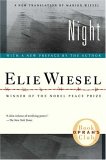Summary | Excerpt | Reading Guide | Reviews | Readalikes | Genres & Themes | Author Bio

Critics' Opinion:
Readers' Opinion:
First Published:
Jan 2006, 144 pages
Paperback:
Jan 2006, 144 pages
Preface to the New Translation
by Elie Wiesel
IF
IN MY LIFETIME I WAS TO WRITE only one book, this would be the
one. Just as the past lingers in the present, all my writings after Night,
including those that deal with biblical, Talmudic, or Hasidic themes,
profoundly bear its stamp, and cannot be understood if one has not read
this very first of my works.
Why did I write it?
Did I write it so as not to go mad or,
on the contrary, to go mad in order to understand the nature
of madness, the immense, terrifying madness that had erupted in history
and in the conscience of mankind?
Was it to leave behind a legacy of words, of memories,
to help prevent history from repeating itself?
Or was it simply to preserve a record of the ordeal
I endured as an adolescent, at an age when one’s knowledge of death
and evil should be limited to what one discovers in literature?
There are those who tell me that I survived in
order to write this text. I am not convinced. I don’t know how
I survived; I was weak, rather shy; I did nothing to save myself. A miracle?
Certainly not. If heaven could or would perform a miracle for me, why
not for others more deserving than myself? It was nothing more than chance.
However, having survived, I needed to give some meaning to my survival.
Was it to protect that meaning that I set to paper an experience in which
nothing made any sense?
In retrospect I must confess that I do not know,
or no longer know, what I wanted to achieve with my words. I only know
that without this testimony, my life as a writer—or my life, period—would
not have become what it is: that of a witness who believes he has a moral
obligation to try to prevent the enemy from enjoying one last victory
by allowing his crimes to be erased from human memory.
For today, thanks to recently discovered documents,
the evidence shows that in the early days of their accession to power,
the Nazis in Germany set out to build a society in which there simply
would be no room for Jews. Toward the end of their reign, their goal changed:
they decided to leave behind a world in ruins in which Jews would seem
never to have existed. That is why everywhere in Russia, in the Ukraine,
and in Lithuania, the Einsatzgruppen carried out the Final Solution by
turning their machine guns on more than a million Jews, men, women, and
children, and throwing them into huge mass graves, dug just moments before
by the victims themselves. Special units would then disinter the corpses
and burn them. Thus, for the first time in history, Jews were not only
killed twice but denied burial in a cemetery.
It is obvious that the war which Hitler and his
accomplices waged was a war not only against Jewish men, women, and children,
but also against Jewish religion, Jewish culture, Jewish tradition, therefore
Jewish memory.
CONVINCED THAT THIS PERIOD in
history would be judged one day, I knew that I must bear witness. I also
knew that, while I had many things to say, I did not have the words to
say them. Painfully aware of my limitations, I watched helplessly as language
became an obstacle. It became clear that it would be necessary to invent
a new language. But how was one to rehabilitate and transform words betrayed
and perverted by the enemy? Hunger—thirst—fear—transport—selection—fire—chimney:
these words all have intrinsic meaning, but in those times, they meant
something else. Writing in my mother tongue—at that point close
to extinction—I would pause at every sentence, and start over and
over again. I would conjure up other verbs, other images, other silent
cries. It still was not right. But what exactly was “it”?
“It” was something elusive, darkly shrouded for fear of being
usurped, profaned. All the dictionary had to offer seemed meager, pale,
lifeless. Was there a way to describe the last journey in sealed cattle
cars, the last voyage toward the unknown? Or the discovery of a demented
and glacial universe where to be inhuman was human, where disciplined,
educated men in uniform came to kill, and innocent children and weary
old men came to die? Or the countless separations on a single fiery night,
the tearing apart of entire families, entire communities? Or, incredibly,
the vanishing of a beautiful, well-behaved little Jewish girl with golden
hair and a sad smile, murdered with her mother the very night of their
arrival? How was one to speak of them without trembling and a heart broken
for all eternity?
Copyright © 2006 by Hill and Wang, a division of Farrar, Straus and Giroux.




These are not books, lumps of lifeless paper, but minds alive on the shelves
Click Here to find out who said this, as well as discovering other famous literary quotes!
Your guide toexceptional books
BookBrowse seeks out and recommends the best in contemporary fiction and nonfiction—books that not only engage and entertain but also deepen our understanding of ourselves and the world around us.